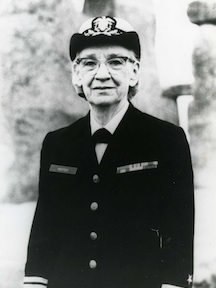By Kathryn James
Over the last few years, college campuses from the University of Mississippi to Georgetown University to the University of Oregon have been consumed by debates over contextualization, collective memory, and institutional racism. Yale University’s debates over contextualization and renaming have consumed media from the Washington Post to to Al Jazeera, most famously regarding Calhoun College. Named for John C. Calhoun (ΦBK, Yale University, 1804), an antebellum South Carolina senator, American Vice President, and graduate of Yale well known for his pro-slavery advocacy, Calhoun College was a centerpiece of the national contextualization debate. On February 11, 2017, Yale University announced that it would be renaming Calhoun College after Grace Murray Hopper (ΦBK, Vassar College, 1928).
Hopper entered academia at a time of relatively high access for women; the rates of women receiving doctoral degrees in the 1920s and 1930s was not again matched until the 1980s. In this environment, she taught mathematics at Vassar, earned a doctorate in mathematics and mathematical physics at Yale, and worked with Richard Courant at New York University.
The well-known expansion of opportunity to women during World War II did not at first apply to Hopper. She applied to join to US Navy Women’s Reserve but was rejected because of her small size. Given her mathematical prowess, she succeeded in gaining assignment to the Bureau of Ships Computation Project at Harvard University in December 1943. There, she worked with Howard Aiken, who had created Mark I (an early IBM computer), to program Mark I. As one of three programmers for Mark I, she wrote the manual for Mark I (no pun intended). After the war ended, she worked to develop Mark II and Mark III — and coined the phrase “debug a computer” after extracting a moth from Mark II.
Though Hopper was instrumental in creating computers critical to the war effort (including calculations for the plutonium bomb), she was not granted a regular commission in the Navy. After Harvard University declined to offer her a tenure-track position for her computing work, she left academia for the private sector. While working as the head programmer for Remington Rand, she developed UNIVAC I and the first complier code, which enables the translation of mathematical code into binary code. She then revolutionized programming through the creation of Flow-Matic, which progressed from mathematical-symbol based programming to programming based on English-language units.
Hopper was a key activist in the adoption of COBOL — a standardized computer coding language — by government and the private sector. Described by her biographer as “the person most responsible for the success of COBOL during the 1960s,” Hopper was a key actor in creating and disseminating computer literacy.
This penchant for standardization allowed Hopper to continue to serve in the Navy; she had remained in the Navy Reserves after World War II, and though she retired 1966, she was almost immediately recalled to duty to standardize the Navy’s computer languages for the Vietnam War. Hopper was the oldest serving officer in the armed forces when she retired as a rear admiral at the age of 79.
Ironically, Yale University may be one of the last organizations in Hopper’s life to take such steps to honor her impact. In 1991, President George H.W. Bush made Hopper the first woman to receive the National Medal of Technology. The Navy commissioned a missile destroyer, the USS Hopper in her honor in 1996. Last year, in 2016, former President Barack Obama posthumously awarded Hopper the Presidential Medal of Freedom.
Yale’s dedication of an undergraduate residential college in Hopper’s memory is a fitting reflection of her own conception of her legacy. Though she is responsible for the creation and adoption of computer coding languages that fundamentally shape modern computing, Hopper did not see that as her greatest impact on the world; rather, when accepting the National Medal of Technology, she said:
“If you ask me what accomplishment I’m most proud of, the answer would be all the young people I’ve trained over the years; that’s more important than writing the first compiler.”
Kathryn James is a senior at the University of Mississippi where she is studying public policy leadership, Southern studies, and economics. The University of Mississippi is home to the Beta of Mississippi Chapter of Phi Beta Kappa.




